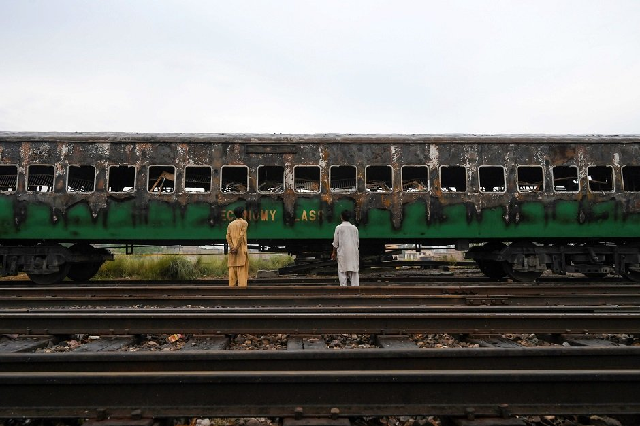Exit where?
There is lots of talk and resources focused on national security, but little interest in general safety

Tezgam Express. PHOTO: APP
When I told my story, first the management was surprised that why would anyone not want to take the elevator. When we went beyond that, the extremely polite manager gave me the standard answer: “Sir, we have told them — and we are working on it.” I don’t know who “them” were, and what “it” was. For some reason, in our standard excuse, there is always a “them”. That goes for our national problems as well.
I wondered what would happen in case of a fire, or any other emergency. On my mind was the recent Tezgam tragedy, and many other disasters from Rawalpindi to Karachi, Lahore to Peshawar, that could have been avoided. Here was a disaster ready to happen, and no one seemed to care. If God forbid something happens, we will readily dole out millions of rupees to the bereaved. It would take a fraction of that to fix the problem right now.
I have been asking my friends, colleagues and those who seem to care, why it is that our attitude to safety is so cavalier. A friend remarked that we simply don’t care about others’ lives. Another said there is no training on safety in any sector. Yet another was more philosophical and said life is cheap here. Most simply shrugged their shoulders and said this is how it is, and has always been.
All this may be true, but isn’t satisfactory. The burden rests on the regulators and the government. In every society, people tend to cut corners — we are no different. Yet, what often makes the difference is creation and enforcement of safety standards that apply uniformly. Regulation is not a one-time solution. It’s a process that requires continuous resources. The recent incident in Islamabad about high-end pharmacies sorting and stocking counterfeit drugs is not just about human behaviour, it’s a testament of the failure of the regulatory system that acts impulsively and is far from proactive. If we were to check all the warehouses of the pharmacies in the country, I predict that the Islamabad incident would be the norm, not an exception. There is lots of talk and resources focused on national security, but little interest in general safety.
Cutting the ribbon in front of a new hospital or re-inaugurating a dam project for the fifth time in a decade makes for a nice photo op. Fixing regulation, however, is boring and hard to get votes on. Successive governments have come, at the Centre and in provinces, and continue to prioritise anything but safety.
An exit that takes us to safety from a calamity whether, natural or created through ill-governance, and helps us survive, is needed in all spaces, physical or social.
Published in The Express Tribune, December 10th, 2019.
Like Opinion & Editorial on Facebook, follow @ETOpEd on Twitter to receive all updates on all our daily pieces.













COMMENTS
Comments are moderated and generally will be posted if they are on-topic and not abusive.
For more information, please see our Comments FAQ